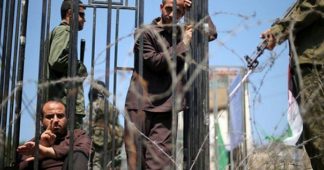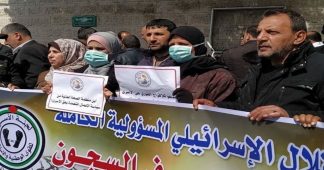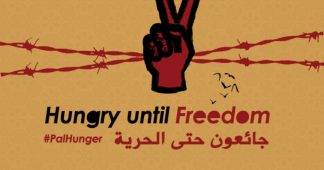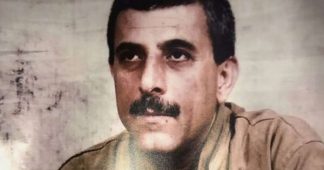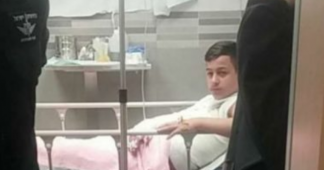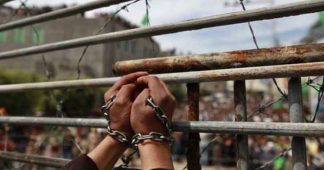By
5 March 2020
Amna Abu Diyak still finds it almost impossible to talk about her son’s death.
“I felt like I was going to collapse when I heard the news,” the 55-year-old told The Electronic Intifada in a phone interview. “I still can’t believe everything that happened. I feel so sorry for my son. He went into prison when he was still a child. And then he was forced to die there.”
Aged 36, Sami Abu Diyak, died in Israeli custody late last year. He had been imprisoned since he was 17.
Amna visited her son a few days before he succumbed to illness on 26 November. On that occasion, prison officers had to bring Sami in a wheelchair for a visit at the Ramle prison.
“He was in such a bad state. He was hardly conscious. I had to keep trying to wake him. It was like he was already dead,” Amna said.
The Israeli Prison Service (IPS) has adopted a “policy of deliberate medical neglect against prisoners and detainees,” since Israel’s occupation of the West Bank, including East Jerusalem, and the Gaza Strip in 1967, Ehteram Ghazawneh of Addameer, a Palestinian prisoner rights group, said.
According to Ghazawneh, 222 Palestinian prisoners have died in Israeli custody since 1967, 67 of whom died owing to medical negligence. Five Palestinians died in Israeli custody in 2019.
Ramleh “not a hospital, it’s a grave”
Sami, who was from Silat al-Dahr village near Jenin in the northern occupied West Bank, was arrested in 2002 during the second Palestinian intifada. He was serving three life sentences in Israeli prison accused of links to al-Aqsa Martyrs’ Brigades, the Fatah movement’s armed wing, and involvement in the killing of three Israelis.
In 2015, he began suffering from abdominal pain while in Rimon prison.
The prison clinic gave him painkillers and failed to properly diagnose him, according to Addameer. Two weeks later he lost consciousness and was transferred to Soroka hospital, where doctors removed his appendix.
After numerous transfers between Ramleh prison hospital and Israeli civilian hospitals, doctors removed 30 cm of his intestines and diagnosed him with cancer.
He slipped into a coma for 34 days after undergoing four operations. For the next eight months, Sami received chemotherapy at the Ramleh clinic.
The Israeli prison authorities allowed Amna one half hour visit every two weeks.
In 2017, Sami began complaining of pain again. He was transferred once again to Ramleh prison clinic, where he underwent tests that found cancer in his stomach.
From there his health began to steadily deteriorate, Amna told the Electronic Intifada.
“He was in serious pain and had six surgeries and was undergoing chemotherapy,” she said. “He started to lose his ability to walk. He went from 95 kilos to just 30. The cancer spread all over his body and his spine.”
According to Qadura Fares, head of the Palestinian Prisoners’ Club, even back in 2015, “all of us basically knew that he was going to die because of the negligence in Israel’s prisons.”
Ehteram Ghazawneh from Addameer noted that the prison clinic’s initial misdiagnosis and the fact Sami was only provided painkillers when he showed symptoms of extreme abdominal pain contributed to the seriousness of his condition later on.
In a letter written by Sami a few days before his death, he said that he wanted to spend his last “days and hours” with his mother and “beloved family.”
“I want to die in my mother’s arms. I don’t want to leave life with my hands and legs handcuffed in front of jailers who love death and delight in our pain and suffering. Will these words find ears by officials? I tell you, if I die away from my mother, I will not forgive you,” Sami wrote.
Amna tried desperately to secure his release before his death, but to no avail.
“Ramleh is not a hospital,” Amna said. “It’s a grave.”
Amna told The Electronic Intifada that the Israeli authorities had refused to allow Sami to be buried at his home in the West Bank, and instead sent his remains to Jordan for burial, because he has Jordanian citizenship along with a Palestinian ID.
Less than a week after Sami’s death, Israeli forces raided the family’s home in the Jenin district and, after ransacking the house, detained Amna’s 22-year-old son Salah.
Salah remains in prison and has not been charged with any crime. Another of Amna’s four children, 36-year-old Samer, has been imprisoned by Israel for almost 15 years, accused of killing Israelis during the second intifada.
Death “wasn’t surprising”
Sami’s case is a “clear example of the harsh prison conditions and the medical negligence of the prisons’ clinics,” Addameer’s Ghazawneh told the Electronic Intifada. The prison clinics do not meet the “minimum standards” for providing medical care, the spokesperson said.
The prison clinics are ill-equipped to deal with serious medical issues, Qadura Fares from the Palestinian Prisoners’ Club, said. Fares himself spent 12 years in Israeli prison.
“The prison doctors are coming from the army and they don’t have the right certifications to be practicing medicine,” he said.
At times, a general doctor visits the prisons, but the prison clinics are only permanently staffed with a nurse, Addameer’s Ghazawneh noted. They lack specialized doctors and equipment for required medical checkups.
Prisoners can request to obtain medical tests or consultations with general or specialized doctors. But these requests often take a “very long time” and can sometimes be altogether ignored by the prison staff who just provide the prisoners with painkillers, Ghazawneh noted.
Qadura Fares told The Electronic Intifada that in the last few months of Sami’s life, he began refusing to be transported in between Ramleh and civilian hospitals because the journey became too painful for him.
“When he is in the hospital, one of his legs and one of his hands are handcuffed to the bed. That’s too much for a person who is suffering from a serious illness,” Fares said. “We weren’t surprised when we got the news of his death.”
Sami’s decision is common. Palestinian prisoners are not transported in ambulances, but go in the bosta, which is the name prisoners give the prison vehicle Israel uses, which separates prisoners into metal cages.
During the transfer, detainees’ legs and arms are shackled, whether or not they are suffering from serious illnesses. Many prisoners opt out of requesting a transfer to a civilian hospital owing to such trips.
Palestinian prisoners also face mistreatment by medical staff in Israel’s civilian hospitals, which often do not provide proper treatment or fail to schedule follow-up appointments following critical surgeries, which can lead to serious medical complications, Addamer’s Ghazawneh said.
Misdiagnoses are also extremely common, Ghazawneh noted, which has delayed prisoners receiving necessary treatment and, in many cases, resulted in death.
The Israel Prisons Service was contacted for comment but did not respond.
“Systematic policy”
Bassam al-Sayih died in Israeli custody about a month before Sami did. Bassam had been arrested in 2015 at Israel’s Salem military court near Jenin in the northern occupied West Bank when he was attending his ex-wife’s court session.
She ultimately spent seven months in prison, according to Khaldoun al-Sayih, Bassam’s brother.
Bassam, from the Nablus district of the northern West Bank, was suffering from bone and blood cancer, a weakness in his heart muscles and medical complications in his liver. Despite these serious health issues, he was interrogated daily for hours, causing him to lose consciousness several times, according to Addameer.
For about 20 days, he was not provided any medical treatment, causing a serious deterioration of his health.
“Due to torture, medical negligence, and stalling in giving him the medical care he needed, his health deteriorated and led to 80 percent failure in his heart and inability to move or speak,” Addameer noted.
Bassam was eventually sentenced to life imprisonment and an additional 30 years. He was accused of being involved in an attack that saw the killing of two Israeli settlers.
His health continued to deteriorate. He was not allowed to undergo operations, according to his brother Khaldoun, and his chemotherapy sessions were often interrupted by prison authorities refusing to allow him access to specialists.
“He was in a very bad state,” Khaldoun told The Electronic Intifada. “I was forced to watch my brother die in prison and I didn’t have any power to do anything about it. We were visiting him as if he was just like every other prisoner – as if he wasn’t dying.”
Following Bassam’s death in September last year, the Israeli authorities withheld the 44-year-old’s body. According to Addameer, Israel is currently holding the remains of five Palestinians who have died in Israeli prisons, including Bassam’s.
Israeli policy allows authorities to withhold the bodies of Palestinians from their families if they are alleged to have been responsible for attacks on Israelis. Prisoner rights organizations like Addameer classify this as a clear case of collective punishment, which is illegal under international law.
“We don’t even know where his body is and we have no idea if we will ever get it back and be able to properly say goodbye,” Khaldoun said.
Addameer’s Ghazawneh told The Electronic Intifada that there are currently about 750 sick Palestinian prisoners in Israeli custody, including 26 women and about 160 men who are in critical need of constant medical care.
The most serious cases involve prisoners suffering from cancer.
Muwaffaq Uruq, 75, was arrested back in 2003. According to a report provided by Addameer, Uruq suffers from stomach cancer, anemia, chronic back pain, and severe pain in the lower limbs and joints.
During his 17 years in prison, he has been transferred between various prisons in Israel, aggravating his condition and causing deterioration of his health. He only began chemotherapy in November last year and is now unable to eat and suffers from persistent vomiting.
He is considered one of the most critical cases among the prisoners in Israel.
And the outlook for these prisoners is bleak, according to some. Qaduara Fares from the Prisoners’ Club, believes medical neglect of Palestinian prisoners is a “systematic policy.”
“It began with the occupation itself,” he said. “They [Israel] want to make us [prisoners] an example for other generations. They want to humiliate us and show what will happen to them if they try and resist the occupation.”
* Jaclynn Ashly is a freelance journalist covering politics and human rights issues in occupied Palestinian territory and Israel.
Published at https://electronicintifada.net/content/prisoners-denied-timely-treatment-dying-israeli-custody/29691
